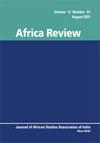Open grazing prohibitions and the politics of exclusivist identity in Nigeria
IF 0.5
Q4 AREA STUDIES
引用次数: 7
Abstract
ABSTRACT This article critically examines the politics of socio-political exclusions, with particular reference to the recurrent surges of herdsmen/farmers’ skirmishes that are currently ravaging many states in Nigeria. Owing to their occupation and prejudiced history, the Fulani herdsmen have not enjoyed full assimilation into mainstream cohesion, and the enactment of laws proscribing ‘open grazing’ by some states, in a bid to protect farmers and farmlands, appears to have further entrenched this supposed exclusion. Consequently, the group, through its Miyetti Allah Cattle Associations, has urged state governments to refrain from enforcing these laws. The implementation of the laws by Benue and Taraba States has caused herdsmen to react angrily by killing hundreds of people in the states. To what extent are these states justified in prohibiting open grazing? Can a group justifiably warn a sovereign, federating, state against implementing a law duly passed by its State Assembly? Using critical analysis, the paper proffers answers to these questions by drawing insights from philosophical arguments of social justice, particularly Nozickian justice as entitlement. Given that what is at stake is the economic livelihoods of both farmers and cattle herders, the paper also provides an objective analysis of the conflict by pointing out the central claims of both parties in the dispute. It concludes that solution to these skirmishes inheres in an approach that emphasizes social justice and inclusion.尼日利亚的露天放牧禁令和排外主义政治
本文批判性地考察了社会政治排斥的政治,特别提到了目前正在尼日利亚许多州肆虐的牧民/农民小规模冲突的经常性激增。由于他们的占领和有偏见的历史,富拉尼牧民没有完全融入主流凝聚力,一些州颁布法律禁止“露天放牧”,以保护农民和农田,似乎进一步巩固了这种所谓的排斥。因此,该组织通过其Miyetti Allah牛协会敦促州政府不要执行这些法律。贝努埃州和塔拉巴州实施的法律引发了牧民的愤怒反应,他们在这两个州杀害了数百人。这些州在多大程度上有理由禁止露天放牧?一个团体可以正当地警告一个主权的、联邦制的州不要执行其州议会正式通过的法律吗?通过批判性分析,本文通过从社会正义的哲学论证,特别是诺齐克正义作为权利的见解,为这些问题提供了答案。考虑到农民和牧民的经济生计受到威胁,本文还通过指出争端双方的核心主张,对冲突进行了客观分析。它的结论是,解决这些小冲突的方法在于强调社会正义和包容。
本文章由计算机程序翻译,如有差异,请以英文原文为准。
求助全文
约1分钟内获得全文
求助全文
来源期刊

Africa Review
AREA STUDIES-
CiteScore
1.80
自引率
12.50%
发文量
22
期刊介绍:
Africa Review is an interdisciplinary academic journal of the African Studies Association of India (ASA India) and focuses on theoretical, historical, literary and developmental enquiries related to African affairs. The central aim of the journal is to promote a scholarly understanding of developments and change in Africa, publishing both original scholarship on developments in individual countries as well as comparative analyses examining the wider region. The journal serves the full spectrum of social science disciplinary communities, including anthropology, archaeology, history, law, sociology, demography, development studies, economics, education, gender studies, industrial relations, literature, politics and urban studies.
 求助内容:
求助内容: 应助结果提醒方式:
应助结果提醒方式:


